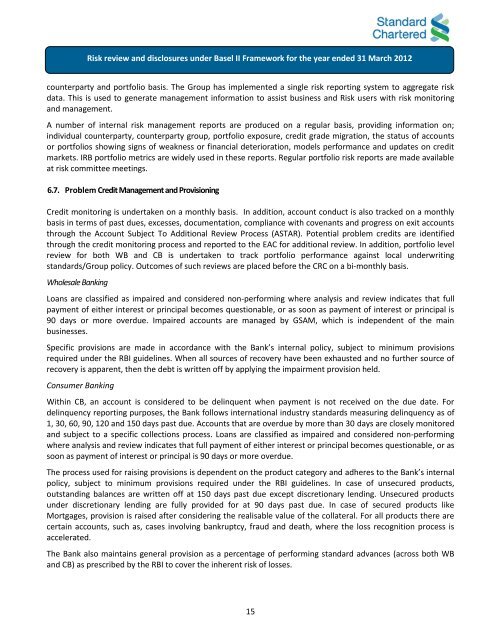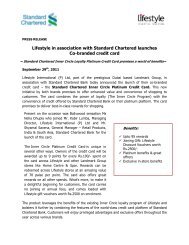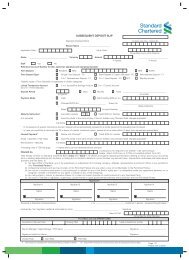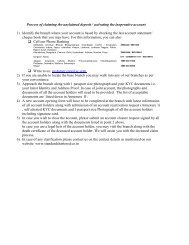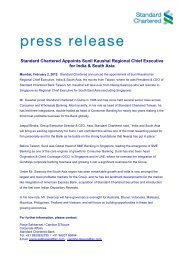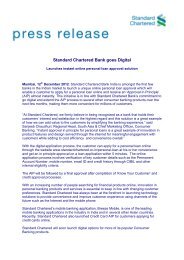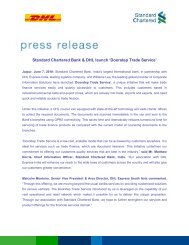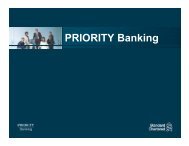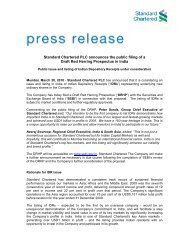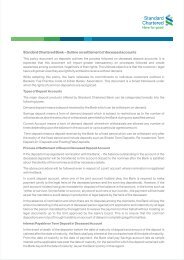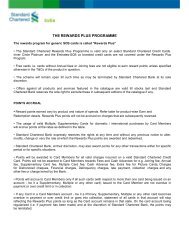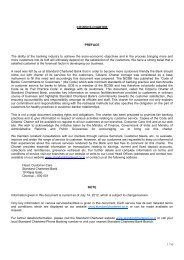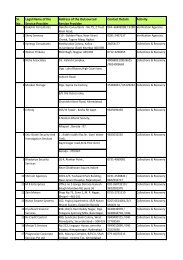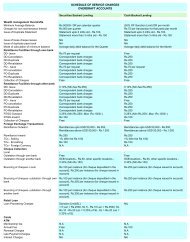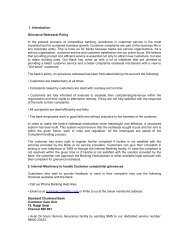March 12 - Standard Chartered Bank
March 12 - Standard Chartered Bank
March 12 - Standard Chartered Bank
You also want an ePaper? Increase the reach of your titles
YUMPU automatically turns print PDFs into web optimized ePapers that Google loves.
Risk review and disclosures under Basel II Framework for the year ended 31 <strong>March</strong> 20<strong>12</strong><br />
counterparty and portfolio basis. The Group has implemented a single risk reporting system to aggregate risk<br />
data. This is used to generate management information to assist business and Risk users with risk monitoring<br />
and management.<br />
A number of internal risk management reports are produced on a regular basis, providing information on;<br />
individual counterparty, counterparty group, portfolio exposure, credit grade migration, the status of accounts<br />
or portfolios showing signs of weakness or financial deterioration, models performance and updates on credit<br />
markets. IRB portfolio metrics are widely used in these reports. Regular portfolio risk reports are made available<br />
at risk committee meetings.<br />
6.7. Problem Credit Management and Provisioning<br />
Credit monitoring is undertaken on a monthly basis. In addition, account conduct is also tracked on a monthly<br />
basis in terms of past dues, excesses, documentation, compliance with covenants and progress on exit accounts<br />
through the Account Subject To Additional Review Process (ASTAR). Potential problem credits are identified<br />
through the credit monitoring process and reported to the EAC for additional review. In addition, portfolio level<br />
review for both WB and CB is undertaken to track portfolio performance against local underwriting<br />
standards/Group policy. Outcomes of such reviews are placed before the CRC on a bi-monthly basis.<br />
Wholesale <strong>Bank</strong>ing<br />
Loans are classified as impaired and considered non-performing where analysis and review indicates that full<br />
payment of either interest or principal becomes questionable, or as soon as payment of interest or principal is<br />
90 days or more overdue. Impaired accounts are managed by GSAM, which is independent of the main<br />
businesses.<br />
Specific provisions are made in accordance with the <strong>Bank</strong>’s internal policy, subject to minimum provisions<br />
required under the RBI guidelines. When all sources of recovery have been exhausted and no further source of<br />
recovery is apparent, then the debt is written off by applying the impairment provision held.<br />
Consumer <strong>Bank</strong>ing<br />
Within CB, an account is considered to be delinquent when payment is not received on the due date. For<br />
delinquency reporting purposes, the <strong>Bank</strong> follows international industry standards measuring delinquency as of<br />
1, 30, 60, 90, <strong>12</strong>0 and 150 days past due. Accounts that are overdue by more than 30 days are closely monitored<br />
and subject to a specific collections process. Loans are classified as impaired and considered non-performing<br />
where analysis and review indicates that full payment of either interest or principal becomes questionable, or as<br />
soon as payment of interest or principal is 90 days or more overdue.<br />
The process used for raising provisions is dependent on the product category and adheres to the <strong>Bank</strong>’s internal<br />
policy, subject to minimum provisions required under the RBI guidelines. In case of unsecured products,<br />
outstanding balances are written off at 150 days past due except discretionary lending. Unsecured products<br />
under discretionary lending are fully provided for at 90 days past due. In case of secured products like<br />
Mortgages, provision is raised after considering the realisable value of the collateral. For all products there are<br />
certain accounts, such as, cases involving bankruptcy, fraud and death, where the loss recognition process is<br />
accelerated.<br />
The <strong>Bank</strong> also maintains general provision as a percentage of performing standard advances (across both WB<br />
and CB) as prescribed by the RBI to cover the inherent risk of losses.<br />
15


